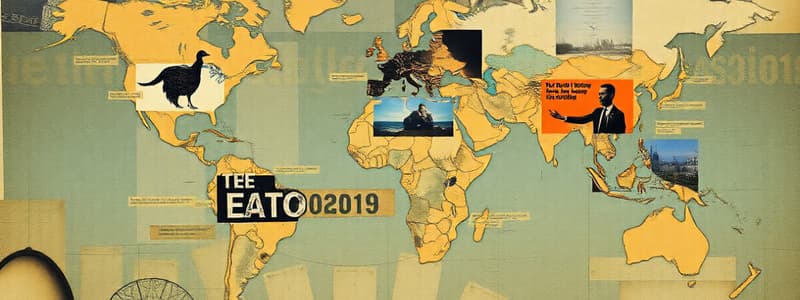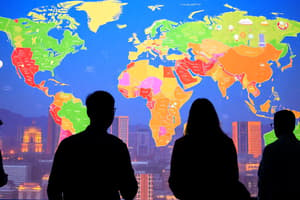Podcast
Questions and Answers
How did the 2008 financial crisis impact global financial activity?
How did the 2008 financial crisis impact global financial activity?
- It caused an immediate increase in financial activity.
- It led to a collapse in activity, which took time to rebuild. (correct)
- It resulted in the establishment of more legal restrictions on capital flows.
- It had no significant impact on the global financial markets.
What characterizes the main pattern of migration observed since 1970?
What characterizes the main pattern of migration observed since 1970?
- Migration patterns are uniform across all countries.
- Migration is predominantly rural and South to South.
- It is largely urban and flows mainly from South to North. (correct)
- Most migration occurs within developing countries only.
What trend regarding remittances has been observed during globalization?
What trend regarding remittances has been observed during globalization?
- Remittances now primarily go to rural areas.
- Remittances and personal financial transfers have shown considerable growth. (correct)
- Remittances have decreased substantially since 2000.
- There is an increasing control over remittances compared to earlier periods.
What is a notable characteristic of the current state of migration compared to the 1870-1914 period?
What is a notable characteristic of the current state of migration compared to the 1870-1914 period?
What implication does deglobalization have on global trade dynamics?
What implication does deglobalization have on global trade dynamics?
What is the primary characteristic of globalization?
What is the primary characteristic of globalization?
How has the pandemic affected global trade?
How has the pandemic affected global trade?
What would be considered a measure of globalization?
What would be considered a measure of globalization?
According to critiques following the Great Recession, what skepticism exists regarding globalization?
According to critiques following the Great Recession, what skepticism exists regarding globalization?
What role does neoliberalism play in globalization according to economic theories?
What role does neoliberalism play in globalization according to economic theories?
Which statement correctly summarizes patterns of trade in recent decades?
Which statement correctly summarizes patterns of trade in recent decades?
What are gravity models in the context of globalization?
What are gravity models in the context of globalization?
Which of the following does NOT reflect the political implications of globalization?
Which of the following does NOT reflect the political implications of globalization?
What factor is primarily considered in thick explanations for the causes of globalization?
What factor is primarily considered in thick explanations for the causes of globalization?
Which economic theory suggests that globalization results from capitalism's tendency to overproduce?
Which economic theory suggests that globalization results from capitalism's tendency to overproduce?
How has modern communications infrastructure impacted globalization?
How has modern communications infrastructure impacted globalization?
What role does neo-liberalism play in globalization according to the content?
What role does neo-liberalism play in globalization according to the content?
Which of the following is a limitation of globalization mentioned in the content?
Which of the following is a limitation of globalization mentioned in the content?
What has significantly facilitated the emergence of post-industrial economies?
What has significantly facilitated the emergence of post-industrial economies?
Which of the following reflects a potential trend of deglobalization?
Which of the following reflects a potential trend of deglobalization?
What impact does the hegemonic power of the US have on globalization?
What impact does the hegemonic power of the US have on globalization?
Flashcards
Deglobalization
Deglobalization
A potential shift away from increased interconnectedness and international exchange, especially through trade, finance, and migration.
Globalization Evidence: Finance
Globalization Evidence: Finance
Increased global financial market activity and turnover since the 1960s, with reduced legal restrictions on capital flow and increased foreign asset ownership, but with some setbacks like the 2008 financial crisis.
Globalization Evidence: Migration
Globalization Evidence: Migration
Predominantly from South to North, urban, and concentrated in a smaller number of countries. Remittances increased, but migration today is more controlled than in 1870-1914.
Global Financial Crisis 2008
Global Financial Crisis 2008
Signup and view all the flashcards
Increased Foreign Ownership
Increased Foreign Ownership
Signup and view all the flashcards
Migration Control
Migration Control
Signup and view all the flashcards
Globalization definition
Globalization definition
Signup and view all the flashcards
Globalization indicators
Globalization indicators
Signup and view all the flashcards
Globalization as a process
Globalization as a process
Signup and view all the flashcards
Globalization trade increase
Globalization trade increase
Signup and view all the flashcards
Globalization trade setbacks
Globalization trade setbacks
Signup and view all the flashcards
Globalization trade historical context
Globalization trade historical context
Signup and view all the flashcards
Globalization Limits
Globalization Limits
Signup and view all the flashcards
Globalization Causes - Difficult to Pinpoint
Globalization Causes - Difficult to Pinpoint
Signup and view all the flashcards
Thick vs. Thin Explanations of Globalization
Thick vs. Thin Explanations of Globalization
Signup and view all the flashcards
Technology's Role in Globalization
Technology's Role in Globalization
Signup and view all the flashcards
Modern Communications Infrastructure
Modern Communications Infrastructure
Signup and view all the flashcards
Orthodox Economics Explanation of Globalization
Orthodox Economics Explanation of Globalization
Signup and view all the flashcards
Radical Economics Explanation of Globalization
Radical Economics Explanation of Globalization
Signup and view all the flashcards
Neo-Liberalism and Globalization
Neo-Liberalism and Globalization
Signup and view all the flashcards
US Hegemony and Globalization
US Hegemony and Globalization
Signup and view all the flashcards
Study Notes
Globalization
- Globalization is defined as the widening, deepening, and speeding up of worldwide interconnectedness.
- It's described as the emergence and operation of a single, worldwide economy.
- Globalization encompasses more than just economics, impacting social and political spheres.
- It's often viewed alongside modernization, Westernization, or liberalization.
- Today, the global economy is considered a "grand narrative" connecting politics and economics.
- Globalization is measured by trade and financial activity patterns. It's a process, not a condition.
- There's debate on the best indicators to assess globalization, with some indicators viewed as inappropriate.
Lecture Plan
- The lecture will discuss what globalization is.
- It will examine the factors driving globalization.
- The importance of globalization will be explored.
- The impact of the pandemic on globalization will be analyzed.
- The lecture will explore the implications of the war in Ukraine for globalization.
Evidence of Globalization: Trade
- Global trade has significantly increased in the last four decades, but remains concentrated among OECD countries and a few East Asian and BRIC economies.
- Regional specializations and barriers still exist.
- Trade levels were higher during the period 1870-1914, compared to percentages of GDP.
- Global trade experienced a sharp drop in 2009, but recovered quickly.
- The pandemic interrupted trade in some ways, causing supply chain issues and price increases.
- Changes in preferences and Chinese lockdowns influenced outsourcing and other significant global trade developments.
- Questions arise about whether there's a shift towards deglobalization.
Evidence of Globalization: Finance
- Financial markets have shown significant growth and activity since the 1960s, especially in the foreign exchange market.
- The global financial services market is also expanding.
- Globalization is qualitatively different than in prior periods.
- Restrictions on capital flows and mobility have decreased compared to earlier periods.
- Foreign ownership of asset classes like equities, bonds, etc. has dramatically increased recently.
- The 2008 financial crisis caused a collapse in financial activity that took time to recover.
Evidence of Globalization: Migration
- The main pattern of migration is from South to North, largely urban.
- A large portion of 1970 migration was concentrated in 23 countries, reduced to 28 countries by 2000.
- Remittances and personal financial transfers are significant aspects of international migration.
- Present day migration is more controlled compared to the period 1870-1914.
- Global migration growth has been significant since 2000 based on UN reports.
- Migration is an urban phenomenon and increasingly gender-balanced.
- Globalization has been politicized in recent years due to crises such as the migrant crisis in 2015, Brexit, and the election of Trump. Also impacted by Covid-19.
KOF Index of Globalization
- The KOF Index measures globalization's economic, social, and political dimensions.
- It also provides sub-indices for various types of flows and proximity.
- Data has been collected on 207 countries annually from 1970-2010.
Globalists and Sceptics
- Globalists see the new era of globalization as confirmed by patterns in international trade, finance, investment, and labor. However, they note the uneven nature of globalization primarily concentrated in OECD countries.
- Sceptics argue that globalization is exaggerated and isn't the sole global force. They also note regionalism and highlight past eras in history where similar phenomena occurred.
The Causes of Globalization
- Identifying the precise causes of globalization is challenging.
- Economic globalization can be analyzed through "thick" (technology being a prime driver), or "thin" (trade liberalization) arguments.
Technology
- Modern communication infrastructures have shrunk the world and facilitated a global economy.
- The information revolution has contributed to the rise of post-industrial economies.
The Economic Logic
- Orthodox economics explains globalization through market dynamics, competition, comparative advantage, and multinational corporations.
- Radical economics argue that globalization stems from the inherent tendencies of capitalism to overproduce, requiring new markets and sources of profit.
Politics
- Neo-liberalism (deregulation, privatization, liberalization) is seen as a key force in globalization.
- The rise of the United States as a global power.
- Changes in relative global power dynamics related to the United States.
- The possible impact of digital commerce and BRICS economies.
Discussion Questions
- The lecture's discussion section will focus on fundamental causes of globalization.
- It will examine if globalization is primarily a political project, rather than strictly economic.
- The lecture will discuss the transition towards potential deglobalization.
Interrogating Globalization
- The lecture features an Irish Times podcast interview with Lionel Barber on globalization.
- Various sources and experts will detail aspects of globalization.
Studying That Suits You
Use AI to generate personalized quizzes and flashcards to suit your learning preferences.




